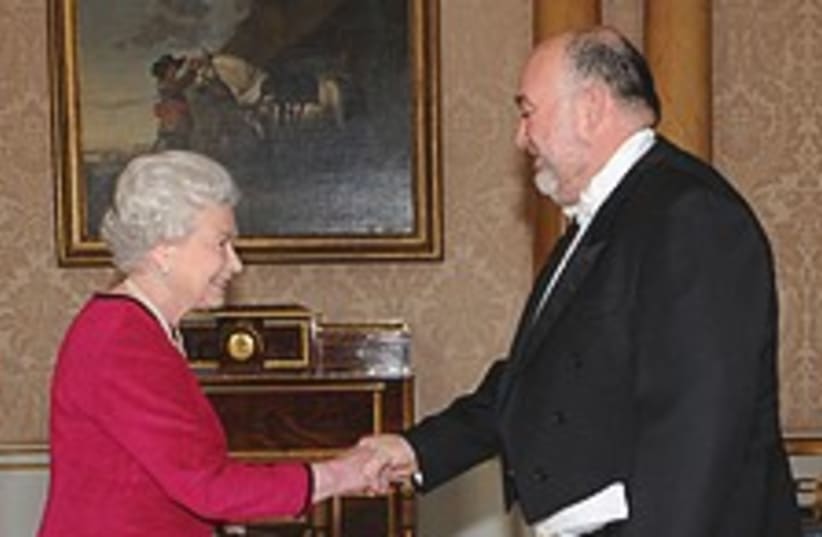UK 'hotbed of radical anti-Israel views'
Israel's ambassador to Britain says average citizen "painfully unaware" of number of attacks from Gaza.
By JONNY PAUL, THE JERUSALEM POST, LONDON
Britain has become a hotbed of radical anti-Israeli views, according to Israel's ambassador to the UK.
Writing in Tuesday's Daily Telegraph newspaper, Ron Prosor said that "fairness is all too frequently absent in a debate that has been hijacked by extremists" and that Israel was constantly forced to justify its existence.
"Israel faces an intensified campaign of delegitimization, demonization and double standards. Britain has become a... haven for disingenuous calls for a 'one-state solution', a euphemistic name for a movement advocating Israel's destruction.
"Those who propagate this notion distort Israel's past while categorically denying Israel's right to exist as a liberal Jewish-democratic state. No other country in the world is constantly forced to justify its own existence," he wrote.
During a previous stint in the UK as press attaché at the embassy, Prosor said, he had developed an admiration of "British values of fairness, decency and common sense." "Throughout its modern history, Britain has prided itself on its liberal society, which cherishes human rights and values civil liberties," he said.
However, since taking up his position as ambassador last November, Prosor said he has been dismayed to find that, as far as Israel is concerned, these values are "under threat." The ambassador attacked a recent decision by an academic trade union to call for a boycott of Israeli academia, calling the decision "a ludicrous oxymoron" and saying that freedom of expression and the pluralistic exchange of ideas were under threat as a result.
"The concept of an academic boycott... [undermines] the democratic principles of free speech and free debate," he said. "Academics, who are supposedly society's guardians of knowledge, objectivity and informed debate, have seen their union held hostage by radical factions, armed with political agendas and personal interests." Israel is the "pantomime villain," he said, with a climate of hatred increasing on university campuses.
"Over-simplifications, half-truths and lies have been swallowed as reality and disseminated as taruth... The complexities of the situation are overlooked, as are the responsibilities of other actors in the region," he said.
He also talked about media coverage of the conflict, saying it often presented issues with a lack of context, employed double standards, and ignored Israel's position.
"Israel's military reaction to the attacks it faces is given in-depth, microscopic coverage. Yet the attacks to which Israel is responding are often ignored. Terror attacks, ambushes, suicide bombings, the constant barrage of rockets being fired on Israeli citizens are frequently disregarded," Prosor declared.
"No government in the world would tolerate such a sustained attack without taking action," he said in regard to the rocket attacks on southern Israel. "The average British citizen is painfully unaware that, since Hamas seized control of Gaza last year, 1,400 rockets and 1,500 mortar shells have landed on Israeli soil." Prosor said he was proud of the open discourse in Israel, but concerned that the discourse in the UK has been hijacked by extremists.
The ambassador called on "those who share the values on which British democracy is built" to say "no" to the "delegitimization of Israel, 'no' to the demonization of Israel and 'no' to the double standards to which Israel is subjected." The article ends with a plea to the British public for fair debate and even-handedness.
"The time has come for the silent majority to speak up and say 'yes'; 'yes' to context, 'yes' to democracy and 'yes' to an understanding of the challenges Israel faces as a democracy under fire."
A former director-general of the Foreign Ministry who has also served in the US and Germany, Prosor said when he arrived in the UK last November that he wanted to present Israel's case as well as focus on media perceptions of Israel.
if(catID != 151){
var cont = `Take Israel home with the new
Jerusalem Post Store
Shop now >>
`;
document.getElementById("linkPremium").innerHTML = cont;
var divWithLink = document.getElementById("premium-link");
if(divWithLink !== null && divWithLink !== 'undefined')
{
divWithLink.style.border = "solid 1px #cb0f3e";
divWithLink.style.textAlign = "center";
divWithLink.style.marginBottom = "40px";
divWithLink.style.marginTop = "40px";
divWithLink.style.width = "728px";
divWithLink.style.backgroundColor = "#3c4860";
divWithLink.style.color = "#ffffff";
}
}
(function (v, i){
});

